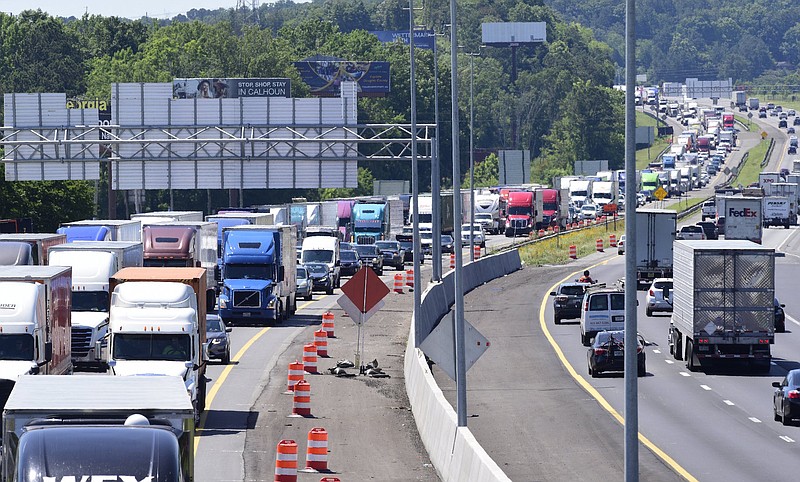NASHVILLE - A $1.2 trillion national infrastructure plan shaped by a bipartisan group of lawmakers that cleared the U.S. Senate this week would provide an estimated $7.55 billion for Tennessee in areas ranging from highway and bridge replacement and repair to public transportation, clean drinking water and airports.
Georgia, meanwhile, is projected to receive $12.33 billion over the course of the Infrastructure Investment & Jobs Act, according to the latest White House estimates.
The Democratic-led Senate approved the measure Tuesday by a 69-30 vote, sending it on to the Democrat-controlled House. But in the House, the measure is apparently becoming entangled over President Joe Biden's separate $3.5 trillion effort to boost social infrastructure in areas including health care, child care, universal Pre-K, climate measures and higher tax revenues.
The Senate infrastructure bill won support from 19 Republicans, including Minority Leader Mitch McConnell of Kentucky. Tennessean Republicans Marsha Blackburn and Bill Hagerty voted no.
Georgia Democratic Sens. Jon Ossoff and Raphael Warnock both voted in favor of the bill.
In a statement, Blackburn said, "Tennesseans are all focused on roads and bridges, but the Democrat spending spree is far from that. Joe Biden has allowed his party to mortgage our children's future by forcing through a bill that will add at least $256 billion to the deficit."
Warner and Ossoff are hailing the bill's Senate passage. Warner said the measure is "as much a jobs bill, because Georgia and America need a home improvement project to keep our country and economy moving forward. Coming out of this pandemic, we have a once-in-a-generation opportunity to repair our nation's infrastructure."
Ossoff said the "historic bipartisan vote to upgrade our infrastructure, promote clean energy and create good-paying jobs will benefit Georgians for generations to come." The Senate has "proven that America's elected leaders can rise above partisanship to serve the national interest," he added.
Asked for Tennessee Republican Gov. Bill Lee's take on the legislation, Lee's press secretary, Casey Black, noted "it's a big price tag, and there's still a long way to go. We'll be watching as Congress continues the debate."
Rae-Anne Bradley, a Chattanooga area-based spokeswoman for the Tennessee Department of Transportation, agreed it's premature to discuss how the money might be spent here if the measure ultimately is signed into law. If it is, Bradley said, it would mean "we would have the ability to continue working through the projects currently in our pipeline. However, the bill also contains additional dollars that we estimate to be around $200M to us per year."
House lawmakers' reaction
U.S. Rep. Chuck Fleischmann, R-Tenn., will be voting no when the bill comes up in the House, according to his spokesman, Justin Doile.
"While Rep. Fleischmann supports hard infrastructure improvements, this bill comes when East Tennesseans are suffering from record-high inflation," he said, adding that Fleischmann worries the $1.2 trillion bill will lead to higher inflation and result in "robbing East Tennesseans of their wages."
U.S. Rep. Scott DesJarlais, R-Tenn., also said he will vote no, charging the bill is "masquerading itself as an infrastructure plan when in reality it is a shell to fund Critical Race Theory projects and elements of the Green New Deal.
In a tweet earlier this week, U.S. Rep. Marjorie Taylor Greene, R-Rome, called the measure "monstrous" and charged it "passes the Green New Deal." The upcoming $3.5 trillion measure "will force America to be completely dependent on Communist China for the government-mandated, battery-operated electric vehicles you will be forced to drive," she stated.
Tennessee, Georgia impact
According to the White House, Tennesseans over a five-year period can expect to see $5.8 billion for federal-aid highway funds for highways and another $302 million for bridge replacement and repairs.
The state would also be eligible for another $630 million over five years for public transportation improvements under a federal formula to fund improvements in a state where one in five transit vehicles "are past useful life" and people using buses and other public transportation spend an extra 67.9% of their time commuting.
Another big-ticket item would provide $697 million for clean water projects such as replacing lead pipes across Tennessee, according to estimates.
Airports are projected to receive $300 million for infrastructure development. The state would also see $88 million as its share of a $7.5 billion national effort to build out a national network of electric-vehicle charging stations that the Biden administration says is a "critical element" to accelerate the adoption of electric vehicles "to address the climate crisis."
A $100 million provision is to help expand internet broadband accessibility to an estimated 400,000 residents in Tennessee. The Biden administration says Tennessee experienced 40 extreme weather events from 2010 to 2020. The legislation includes $17 million to fight wildfires. There's another $21 million to ward off cyber attacks here.
The White House estimates Georgia would see $8.9 billion under the federal-aid highway apportioned programs and $225 million for bridge repairs or replacements.
"This funding could be used to address an estimated 80% of Georgia's bridges that are considered in poor condition, including making improvements to some of Georgia's oldest bridges long in need of repair - like the I-75 bridge over Swamp Creek in Whitfield County," Warnock stated, adding it was built in 1961.
Georgia public transportation, meanwhile, could receive $1.4 billion if and when the legislation is finalized. White House projections also show $913 million for clean drinking water efforts.
Another $135 million over five years would go toward building the electric-vehicle charging network, according to the White House. The state would also receive the $100 million to help with high-speed internet accessibility. Another $22 million would go toward combating wildfires and $24 million to counter cyber attacks.
Contact Andy Sher at asher@timesfreepress.com or 615-255-0550. Follow him on Twitter @AndySher1.
